Do you buy ‘store brand’ products from your local grocery store? Or have you ever bought a t-shirt or custom coffee mug from an eCommerce site that uses dropshipping?
If so, then you’ve purchased white-label products before.
What is white labeling?
It’s a business model where a company purchases products or services from a third-party provider so they can turn around and resell them under their own brand name.
For instance, the store-brand peanut butter you bought wasn’t manufactured by your local grocery store. Instead, they purchased it from a white-label company and then rebranded it under their name.
Great Value from Walmart and Kirkland Signature from Costco are two examples of grocery store brands that use white-label products.
White-label products often go on to feature different prices, packaging, and branding once the purchasing company’s brand takes over.
Besides white labeling products, white label services are also a thing – and they’re widely popular in the digital marketing/SEO/link-building space.
Digital marketing agencies can expand the services they offer by working with white-label marketing companies, and they’re a great way to save money – assuming you work with the right provider.
As with anything else, you need a rock-solid strategy and the right company to work with to see desirable results from your white labeling efforts.
That’s why we’ve compiled everything you need to know about white labeling, including when it’s a good idea to use it, so read on to learn more.
Understanding White Label Products
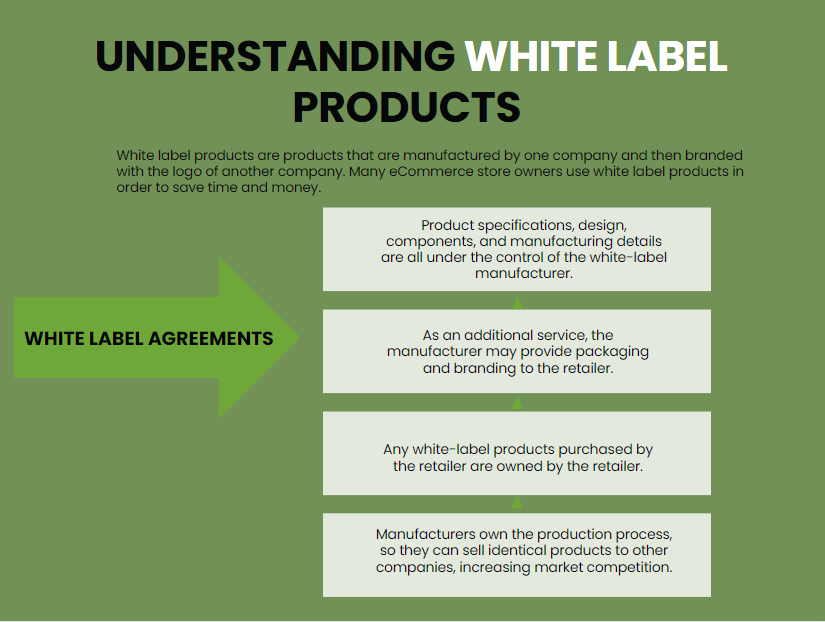
If you’ve ever heard of dropshipping for eCommerce stores, then you’re familiar with the white-label business model.
Dropshipping is where an eCommerce store owner chooses a separate company to manufacture, customize, and ship their products to customers.
This provides numerous benefits to the store owner, as they don’t have to pay a costly overhead or spend time creating and shipping products. Instead, they can spend all their time forging new customer relationships, promoting their products, and brainstorming ways to increase revenue.
A common example is an eCommerce store that sells t-shirts or coffee mugs with custom graphic designs.
The store owner may create the designs but does not manufacture or ship the actual products. Instead, a white-label company manufactures the t-shirts and mugs and then prints the custom designs on the products.
Besides dropshipping, plenty of other types of companies use white labeling to expand their services and save time & money.
We already mentioned how many grocery stores use white-label solutions to produce generic products for their store brands, but did you know that Dollar Shave Club also uses the white-label business model?
They use a third-party company to manufacture their razors, which freed them up to create the revolutionary shipping model that defines their business to this day.
White label agreements
Whenever two companies engage in the white-label business model, they agree to the following rules:
-
The white-label manufacturer has complete control over the product’s specifications, design, components, and manufacturing details.
-
The retailer has total control over the packaging and branding of the product, which the manufacturer may provide as an additional service.
-
The retailer owns the brand name and trademarks for any white-label products they purchase.
-
Since the manufacturer owns the production process, they have the right to sell identical products to other companies, which can increase competition in the marketplace.
To summarize, the white-label company controls product development, and the retailer controls packaging and brand identity.
Since white-label companies are free to sell the same products to other companies, there could be two identical products on the shelf under different brand names. That’s definitely something to consider when determining if you want to engage in white labeling or not, especially if your product has a higher price.
Understanding White Label Services
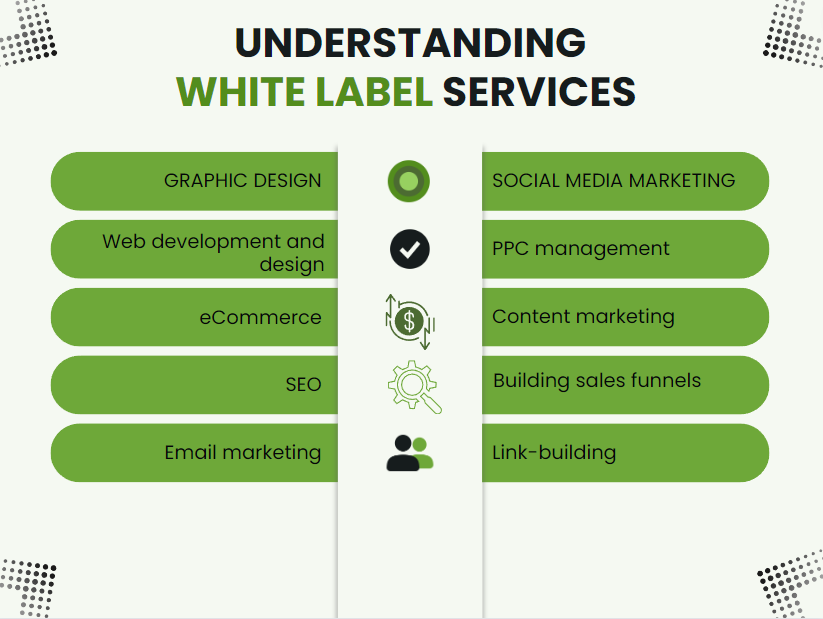
Does your digital marketing company want to add link-building as one of its services but lacks the personnel to do so in-house?
Then you can use a white-label marketing agency to add link-building to your repertoire – all without having to expand your team.
That’s an example of white label services in action, where you outsource a particular service to a third party to rebrand & resell it under your brand name.
Of course, you’ll need to take into account what the white label agency charges you for link-building and then markup your prices accordingly. Still, outsourcing particular services can be healthy & profitable for companies, especially startups that are still growing their operations.
Another example of white labeling is SaaS (software-as-a-service).
These companies provide white-label software programs for everything from designing landing pages to workflow automation.
As with white-label products, the companies purchasing these services are free to repackage and rebrand the software as their own.
Here are some popular examples of white-label services that companies use today:
-
Graphic design
-
Web development and design
-
eCommerce
-
SEO
-
Email marketing
-
Social media marketing
-
PPC management
-
Content marketing
-
Building sales funnels
-
Link-building
-
Citations
In a nutshell, you can add virtually any type of service you want through white labeling, but you need to pay close attention to what each white label company charges – as well as the quality of their products/services.
White Label vs. Private Label: What’s the Difference?
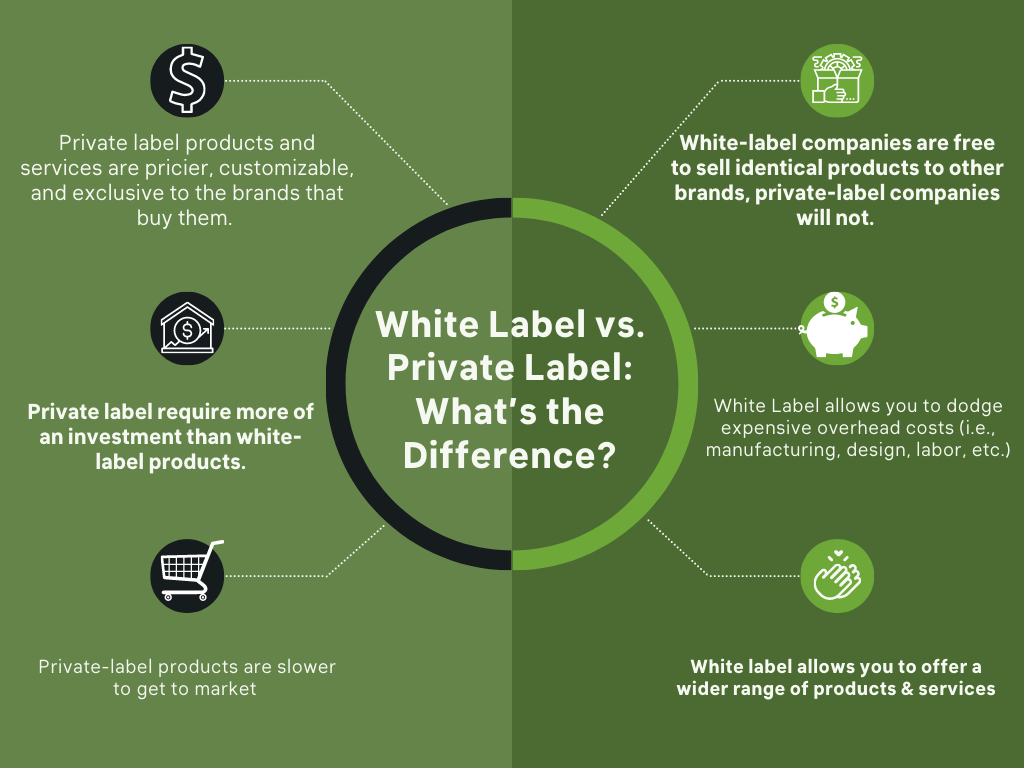
While some use the terms white label and private label interchangeably, there are differences between the two.
Namely, private label products and services are pricier, customizable, and exclusive to the brands that buy them.
Whereas white-label companies are free to sell identical products to other brands, private-label companies will not.
That means if you purchase a private label product, you’ll be the only one that sells it.
While the manufacturer still has a significant amount of control over the production process, private-label products and services are customizable.
That means, as the purchasing company, you will have some say over how your new products look & feel, which is a plus.
The downsides to going the private label route are the following:
- They require more of an investment than white-label products
- Private-label products are slower to get to market
If you want your company to have high-quality, exclusive products and services, then going the private label route is worth it.
Yet, if your ultimate goal is to expand your product/service line quickly and affordably, white labeling is the way to go. What are the Benefits of White Labeling?
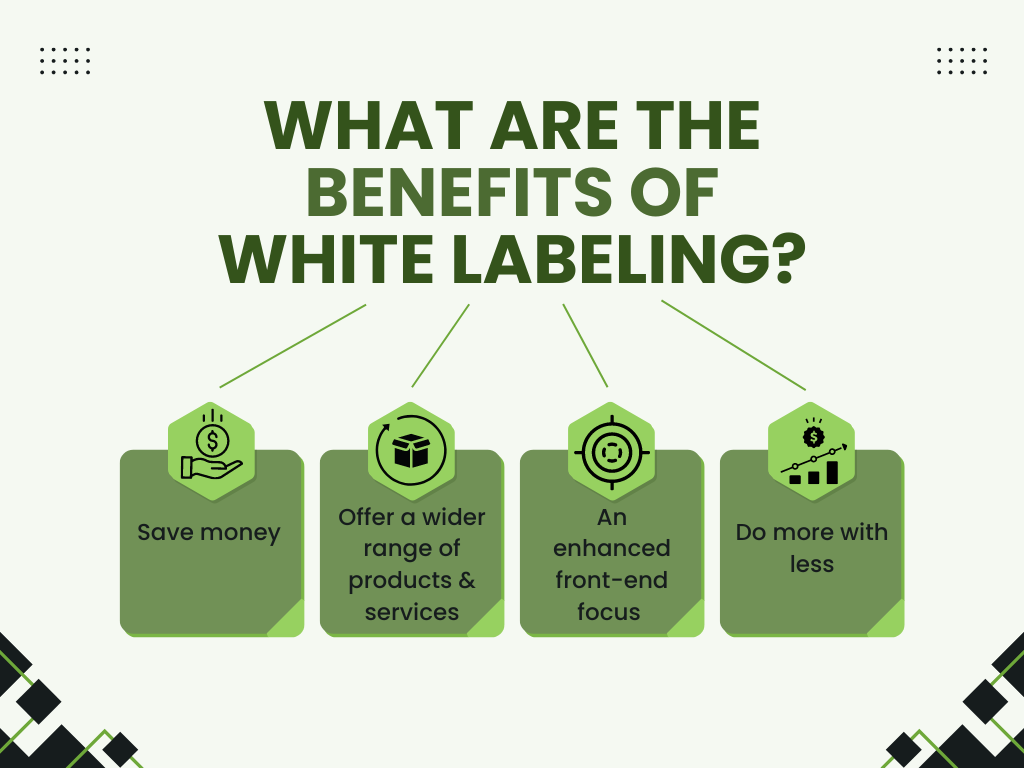
White labeling is a great way for startups, small businesses, and entrepreneurs to start expanding what they can offer while avoiding a whole host of headaches.
In particular, white labeling will benefit your business in the following ways:
-
You can dodge expensive overhead costs (i.e., manufacturing, design, labor, etc.).
-
It enables you to add new products and services to your repertoire without expanding your in-house teams.
-
It provides more time to focus on the front end of your business (i.e., strengthening customer relationships, providing excellent customer service, etc.).
-
You’ll be able to do more with less.
These benefits are significant, so let’s take a closer look at each one.
Save money
Let’s say that you want to add link-building as one of your digital marketing services due to a large number of client requests.
Well, hiring an in-house team of full-time link-building specialists involves taking on massive overhead costs in the form of salaries, benefits, insurance, training, onboarding, and more.
That’s a cost that even larger companies can’t always afford, which is why white-label services come in so handy.
Instead of trying to find, hire, and train a team of link-building experts, you can outsource the work to a trusted white-label link-building agency at a fraction of the cost.
They’ll have an established team of link-building gurus that won’t waste any time acquiring high-authority guest posts for your clients, and your agency gets to take credit for everything.
All the while, you won’t have to do much to aid in the link-building process, giving you plenty of time to provide stellar service to your clients, build a loyal client base, and boost your reputation.
If you’re an entrepreneur lacking the funds to manufacture products for an online business, white labeling will allow you to start a business for far less money.
You could opt for the dropshipping eCommerce route, or you could choose another white-labeling avenue, like using a white-label company to provide products for a physical location you own.
Offer a wider range of products & services
Going with the eCommerce example, if you want to expand what you’re able to offer, white labeling is a reliable & affordable option.
For instance, if you only offer one existing product that you manufacture in-house, you can add more items to your inventory through white labeling.
These could be generic products like tumblers or coffee mugs, or you could opt for private-label products to build a unique brand identity.
Software companies and digital marketing agencies can expand their service offerings vastly with white labeling solutions and SaaS companies.
A wider range of products and services will lead to a better customer experience, especially if your clients have been asking for you to expand.
A common example is when a digital marketing agency offers some SEO services but doesn’t include things like content creation and link-building. If they aren’t able to satisfy their client’s needs, they may begin to abandon ship in favor of more extensive digital agencies – which is why white labeling is important.
An enhanced front-end focus
Your team needs plenty of time to focus on the front end of your business, catering to your client’s needs and exceeding their expectations.
White labeling also makes it easier to maintain brand consistency, which is extremely important for building a loyal customer base.
The proof?
Research shows that consistent brand presentation can increase revenue by 23%.
Additionally, 54% of companies report that brand consistency has substantially contributed to their business growth.
By white labeling your products and services, you’ll have more time to spend creating and revising your brand guidelines to ensure you stay consistent.
When Should You Consider White Labeling?
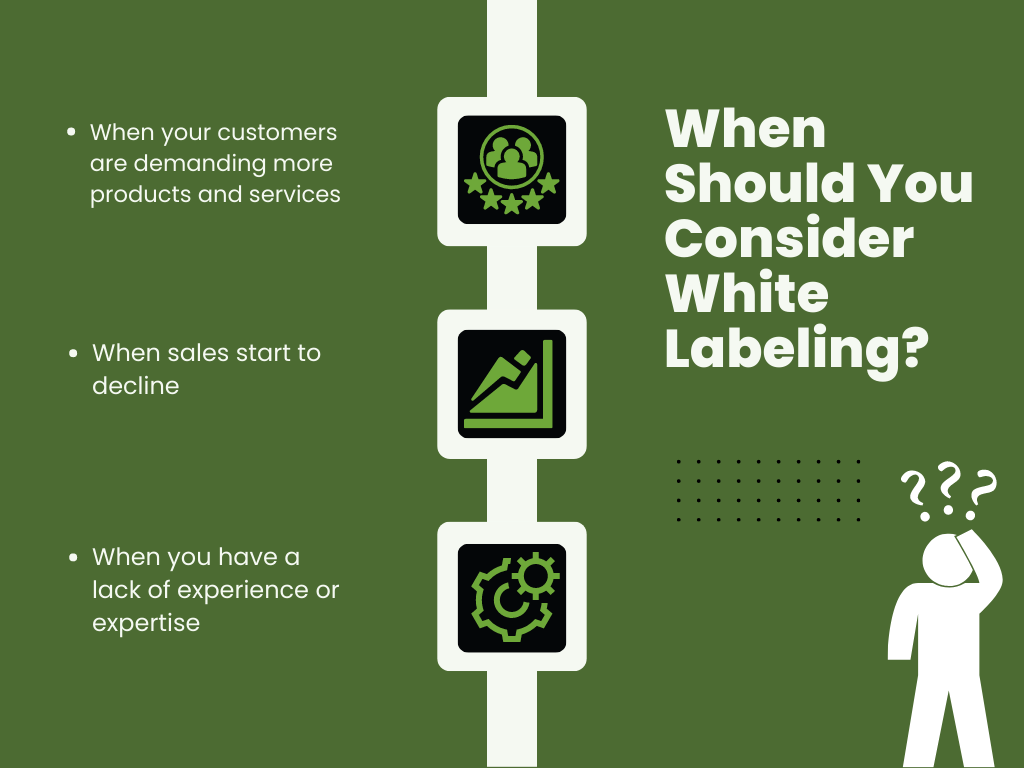
Now that you know all the ways white labeling can enhance your business, how do you know when it’s time for your company or marketing agency to don the white label?
Luckily, it’s not a guessing game, as there are some telltale signs when you should consider white-label products and services as a viable option.
When your customers are demanding more products and services
We’ve already gone over a scenario where clients asked more of a digital marketing agency, and that’s not the only situation where your customers will ask more of you.
It could be that your online store lacks enough products or that your graphic design service doesn’t offer web design on the side.
Whatever your additional needs are, whenever your clients are asking for more, it’s time to consider outsourcing something new to a white-label company.
When sales start to decline
If your revenue is starting to take a dive, it’s time to consider shaking things up – and white labeling could be just what the doctor ordered.
For example, if your marketing agency is starting to see some clients leave, it could be that you need to add some new services to your package to attract them back.
Or, if customers are growing bored with your eCommerce products, you could try dropshipping or working with a white-label company to add something new.
When you have a lack of experience or expertise
If your company needs to add a new product or service that you lack experience with, it’s best not to wing it and opt to outsource via a white-label company instead.
That way, your new offering will be in expert hands, and you won’t have to cram any last-minute training to become a certified web designer.
Wrapping Up: What is White Labeling?
To summarize, white labeling is when a company outsources a product or service to a third party that they then rebrand as their own.
It’s a tried-and-true practice that many companies use, from startup eCommerce stores to grocery store behemoths like Walmart and Costco.
When done right, white labeling is a fantastic way to expand your business without enduring massive overhead costs.
Do you need expert help with link-building services at your company or marketing agency?
Then don’t wait to check out ABC Plus, our fully custom link-building campaigns executed by top SEO professionals.
The post What is White Labeling, and When Should You Use It? first appeared on Authority Builders.


